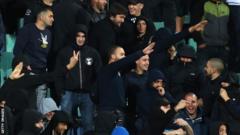

THE “football family and governments” need to “wage war on the racists”, says Uefa president Aleksander Ceferin after the abuse of England players by home fans in Bulgaria.
Monday’s Euro 2020 qualifier between the sides was halted twice due to racist abuse of England players.
Ceferin said football associations cannot solve the issues alone.
“Only by working together in the name of decency and honour will we make progress,” he said.
European football’s governing body Uefa has opened disciplinary proceedings against Bulgaria, charging them with the racist behaviour, including Nazi salutes and monkey chants, of their fans.
The disruption of both teams’ national anthems by opposing fans will also be investigated.
Monday night’s scenes have been widely condemned by players and politicians.
The president of the Bulgaria Football Union resigned on Tuesday after being told to quit by the country’s prime minister.
In a statement, Ceferin said Uefa was committed to doing everything it can “to eliminate this disease from football”.
“There were times, not long ago, when the football family thought that the scourge of racism was a distant memory,” Ceferin said.
“The last couple of years have taught us that such thinking was, at best, complacent.
“The rise of nationalism across the continent has fuelled some unacceptable behaviour and some have taken it upon themselves to think that a football crowd is the right place to give voice to their appalling views.”
Football’s world governing body Fifa said going forward it could “extend worldwide” any sanctions by Uefa, or by the other continental confederations, imposed for racist behaviour.
President Gianni Infantino said the sport needed “to think more broadly on what we can do to fix this”.
He called racism in football an “obnoxious disease that seems to be getting even worse in some parts of the world” and said life bans from stadiums should be handed to those found guilty. “Fifa can then enforce such bans at a worldwide level.”
The UK government has written to Uefa to demand more action.

 Uefa statement in full
Uefa statement in full“There were times, not long ago, when the football family thought that the scourge of racism was a distant memory. The last couple of years have taught us that such thinking was, at best, complacent.
“The rise of nationalism across the continent has fuelled some unacceptable behaviour and some have taken it upon themselves to think that a football crowd is the right place to give voice to their appalling views.
“As a governing body, I know we are not going to win any popularity contests. But some of the views expressed about Uefa’s approach to fighting racism have been a long way off the mark.
“Uefa, in close cooperation with the Fare network (Football Against Racism Europe), instituted the three-stage protocol for identifying and tackling racist behaviour during games.
“Uefa’s sanctions are among the toughest in sport for clubs and associations whose supporters are racist at our matches. The minimum sanction is a partial closure of the stadium – a move which costs the hosts at least hundreds of thousands in lost revenue and attaches a stigma to their supporters.
“Uefa is the only football body to ban a player for ten matches for racist behaviour – the most severe punishment level in the game. Believe me, Uefa is committed to doing everything it can to eliminate this disease from football. We cannot afford to be content with this; we must always strive to strengthen our resolve.
“More broadly, the football family – everyone from administrators to players, coaches and fans – needs to work with governments and NGOs to wage war on the racists and to marginalise their abhorrent views to the fringes of society.
“Football associations themselves cannot solve this problem. Governments too need to do more in this area. Only by working together in the name of decency and honour will we make progress.”

Uefa also charged Bulgaria with throwing objects and showing replays on a giant screen.
England were also charged with providing an insufficient number of stewards. No date has been set for a hearing.
Bulgaria coach Krasimir Balakov said after the match that he “did not hear” any racist chanting.
The Vasil Levski Stadium was already partially closed for the match after Bulgaria were sanctioned for racist behaviour during qualifiers against Kosovo and the Czech Republic.

After making a pass in the first half, Mings glanced over his shoulder and could be heard calling towards the touchline: “Did you hear that?”
The game was stopped in the 28th minute and a stadium announcement was made to condemn racist abuse and warn fans that the game could be abandoned if it continued.
The game resumed but was stopped again just before half-time. Manager Gareth Southgate and several England players were in discussion with match officials before the game was restarted for a second time.
A group of Bulgaria supporters wearing black hooded tops – some wearing bandanas covering their faces – started to leave the stadium after the game was halted for a second time. BBC Radio 5 Live reported that some made racist gestures while heading towards the exits.
After six minutes of time added at the end of the first half because of the delay, Bulgaria captain Ivelin Popov was seen in a heated debate with a section of home supporters near the tunnel while the rest of the players headed for the dressing rooms for half-time.
Anti-discriminatory body Fare has called for Bulgaria to be expelled from the Euro 2020 qualifying campaign.
“We think that after what happened, Uefa has it in their power to kick Bulgaria out of Euro 2020 qualification for sure,” said Fare Eastern Europe development officer Pavel Klymenko.
“There have been too many incidents, too much negligence from the Bulgarian FA. Uefa should make an example of the Bulgarian FA and expel them from the competition.”
In line with Uefa protocol, England had the option to walk off the pitch but they continued to play the full 90 minutes.
England defender Tyrone Mings, one of the players who was abused, said “the manager, the team and the supporting staff” came together to make the decision to play and he was “very proud” of the decision. – bbc.com